I'm writing a wrapper for the Xero API, using oAuth and two-legged authentication. It is a "private" application, as Xero calls it, which requires a RSA-SHA1 signature. The Coldfusion oAuth wrapper doesn't have a function for encrypting in RSA-SHA1, only HMAC-SHA1. We are on CF9.
Consequently, in the course of running a GET request, I get the following error:
signature_method_rejected
Private applications must use the RSA-SHA1 signature method
So, it looks like the GET call is working, but the issue is with the signature method. I found what I thought looked like the solution someone created, as follows:
<cffunction name="rsa_sha1" returntype="string" access="public" descrition="RSA-SHA1 computation based on supplied private key and supplied base signature string.">
<cfargument name="signKey" type="string" required="true" hint="base64 formatted PKCS8 private key">
<cfargument name="signMessage" type="string" required="true" hint="msg to sign">
<cfargument name="sFormat" type="string" required="false" default="UTF-8">
<cfset var jKey = JavaCast("string", arguments.signKey)>
<cfset var jMsg = JavaCast("string",arguments.signMessage).getBytes(arguments.sFormat)>
<cfset var key = createObject("java", "java.security.PrivateKey")>
<cfset var keySpec = createObject("java","java.security.spec.PKCS8EncodedKeySpec")>
<cfset var keyFactory = createObject("java","java.security.KeyFactory")>
<cfset var b64dec = createObject("java", "sun.misc.BASE64Decoder")>
<cfset var sig = createObject("java", "java.security.Signature")>
<cfset var byteClass = createObject("java", "java.lang.Class")>
<cfset var byteArray = createObject("java","java.lang.reflect.Array")>
<cfset byteClass = byteClass.forName(JavaCast("string","java.lang.Byte"))>
<cfset keyBytes = byteArray.newInstance(byteClass, JavaCast("int","1024"))>
<cfset keyBytes = b64dec.decodeBuffer(jKey)>
<!--- keyBytes = 48-111-10345-125-5349-114-581835-28-330-3984120-2848-4384-1-43 --->
<cfset sig = sig.getInstance("SHA1withRSA", "SunJSSE")>
<!--- error occurs on the line below --->
<cfset sig.initSign(keyFactory.getInstance("RSA").generatePrivate(keySpec.init(keyBytes)))>
<cfset sig.update(jMsg)>
<cfset signBytes = sig.sign()>
<cfreturn ToBase64(signBytes)>
</cffunction>
It receives the following arguments:
SFORMAT UTF-8
SIGNKEY 0JxxxxxxxxxxxxxxxxxxxP&
SIGNMESSAGE GET&https%3A%2F%2Fapi.xero.com%2Fapi.xro%2F2.0%2FContacts&contactid%3D%26contactnumber%3D%26name%3D7-Eleven%26oauth_consumer_key%3Dxxxxxxxxxxxxxxxx%26oauth_nonce%3Dxxxxxxxxxxxxxxxx%26oauth_signature_method%3DRSA-SHA1%26oauth_timestamp%3D1339055484%26oauth_version%3D1.0
However, this produces the following error:
Could not read BER data.(ASN1Lengths.determineLengthLen: length greater than 0x7FFF,FFFF.)
ColdFusion cannot determine the line of the template that caused this error. This is often caused by an error in the exception handling subsystem.
Can anyone could shed any light on this?
EDIT ----

There is a link for uploading the public cert, which I did. THere is also a note saying: "Note, For Private applications, the consumer token and secret are also used as the access token and secret.". So I am assuming I need the "Consumer Secret" value shown there in order to sign the request. That being the case, how do I convert that secret key value to RSA-SH1 format for the signature?